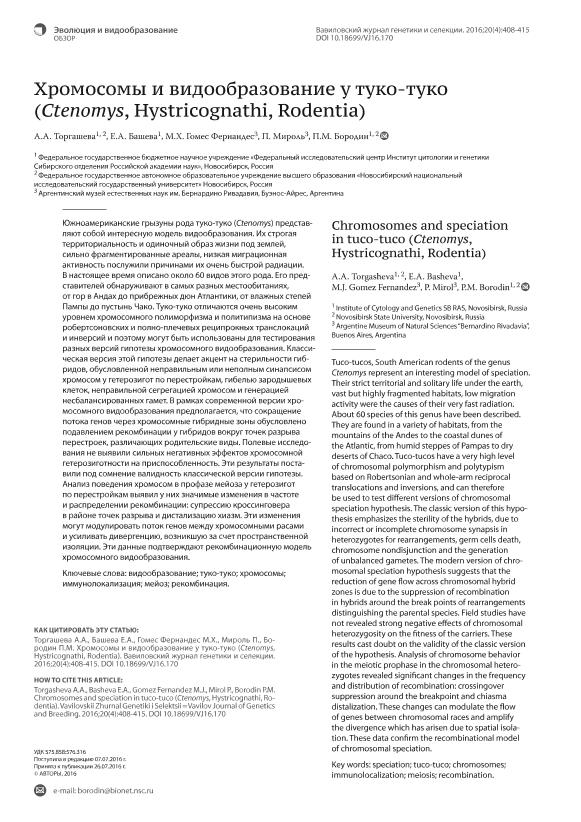Artículo
Chromosomes and speciation in tuco-tuco (Ctenomys, Hystricognathi, Rodentia)
Título:
Хромосомы и видообразование у туко-туко (Ctenomys, Hystricognathi, Rodentia)
Torgasheva, Anna A.; Savchenko, Ekaterina; Gomez Fernandez, Maria Jimena ; Mirol, Patricia Monica
; Mirol, Patricia Monica ; Borodin, Pavel M.
; Borodin, Pavel M.
 ; Mirol, Patricia Monica
; Mirol, Patricia Monica ; Borodin, Pavel M.
; Borodin, Pavel M.
Fecha de publicación:
09/2016
Editorial:
Institute of Cytology and Genetics of Siberian Branch of the Russian Academy of Sciences
Revista:
Vavilov Journal of Genetics and Breeding
ISSN:
2500-0462
e-ISSN:
2500-3259
Idioma:
Ruso
Tipo de recurso:
Artículo publicado
Clasificación temática:
Resumen
Tuco-tucos, South American rodents of the genus Ctenomys represent an interesting model of speciation. Their strict territorial and solitary life under the earth, vast but highly fragmented habitats, low migration activity were the causes of their very fast radiation. About 60 species of this genus have been described. They are found in a variety of habitats, from the mountains of the Andes to the coastal dunes of the Atlantic, from humid steppes of Pampas to dry deserts of Chaco. Tuco-tucos have a very high level of chromosomal polymorphism and polytypism based on Robertsonian and whole-arm reciprocal translocations and inversions, and can therefore be used to test different versions of chromosomal speciation hypothesis. The classic version of this hypothesis emphasizes the sterility of the hybrids, due to incorrect or incomplete chromosome synapsis in heterozygotes for rearrangements, germ cells death, chromosome nondisjunction and the generation of unbalanced gametes. The modern version of chromosomal speciation hypothesis suggests that the reduction of gene flow across chromosomal hybrid zones is due to the suppression of recombination in hybrids around the break points of rearrangements distinguishing the parental species. Field studies have not revealed strong negative effects of chromosomal heterozygosity on the fitness of the carriers. These results cast doubt on the validity of the classic version of the hypothesis. Analysis of chromosome behavior in the meiotic prophase in the chromosomal heterozygotes revealed significant changes in the frequency and distribution of recombination: crossingover suppression around the breakpoint and chiasma distalization. These changes can modulate the flow of genes between chromosomal races and amplify the divergence which has arisen due to spatial isolation. These data confirm the recombinational model of chromosomal speciation.
Palabras clave:
Speciation
,
Tuco-Tuco
,
Chromosomes
,
Immunolocalization
,
Meiosis
,
Recombination
Archivos asociados
Licencia
Identificadores
Colecciones
Articulos(MACNBR)
Articulos de MUSEO ARG.DE CS.NAT "BERNARDINO RIVADAVIA"
Articulos de MUSEO ARG.DE CS.NAT "BERNARDINO RIVADAVIA"
Citación
Torgasheva, Anna A.; Savchenko, Ekaterina; Gomez Fernandez, Maria Jimena; Mirol, Patricia Monica; Borodin, Pavel M.; Chromosomes and speciation in tuco-tuco (Ctenomys, Hystricognathi, Rodentia); Institute of Cytology and Genetics of Siberian Branch of the Russian Academy of Sciences; Vavilov Journal of Genetics and Breeding; 20; 4; 9-2016; 408-415
Compartir
Altmétricas



